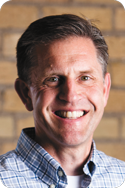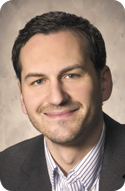
Experiental Learning: Ventures
Monday, April 1, 2013
BY CHRISTOPHER PEDERSON
During its nearly 100-year existence, the Carlson School has educated and nurtured hundreds of entrepreneurs who have gone on to build companies in the Twin Cities and around the globe. Over the last decade, the Carlson Ventures Enterprise (CVE) has carried on that tradition by blending coursework and real-world experience to help students shape business opportunities, understand the mechanics of business, and devise innovative solutions to real-world issues.
In short, it’s a laboratory for entrepreneurship, a place to learn how to devise, develop, and sustain new ideas. But while it’s easy to equate entrepreneurship with the gritty bootstrappers who start companies from scratch, its core skills are equally valuable for people who manage corporate initiatives, research new markets, deal with customers, or perform any tasks that drive companies forward on a daily basis.
With that in mind, here’s a look at how the CVE has made a lasting impression on both a client company and a recent graduate.
Logic PD
Logic PD is an Eden Prairie, Minn.-based firm that provides design, engineering, manufacturing, and supply chain management solutions to companies around the world. It’s also a long-time CVE client. Executive Vice President and CTO Scott Nelson says the relationship began with a visit to the company by CVE Director Toby Nord. “We realized that the Enterprise was well suited to help us,” says Nelson. “It could provide us with a team of bright, energetic students to perform research and analysis that could be highly useful for our company.”
The relationship kicked off with a cluster analysis of Logic’s customers by market and geography. “Our business has a certain level of geographical sensitivity,” says Nelson, adding that the company also has facilities in Boston and San Diego. “When you’re doing contract design and manufacturing, customers like to be close to their design teams, in part to ensure that communication remains fluid. The student team’s data gave us a clear picture of our overall geography and ways we could leverage it with our unique value proposition.”
The second project saw the student team dig into new and proposed regulations that could affect Logic’s customers (and potential customers). “They gave us an evaluation of the impact of a wide range of regulations, identified key markets, and provided an analysis of opportunities for us,” Nelson says. “For example, one key point they uncovered was that all medical devices will be required to have unique, readable identifiers—barcodes, QR codes, serial numbers, etc.—by 2014. This will have a tremendous impact on many companies, and it’s precisely the sort of issue that we can help them address.”
Logic PD is now on its third engagement with the CVE. A new student team is researching a set of emerging technologies, many of which have undefined regulations at this point. As Nelson explains, their work will build on the previous project and has the potential to open up numerous opportunities for the company.
“We’ve been tremendously impressed with the Ventures students’ work,” Nelson adds. “It’s been a win-win. They’ve provided us with tangible results. And we’re pleased that we’ve been able to provide them with real-world experience and a foundation that will be extremely valuable whether they decide to work for start-ups or larger companies.”
Ryan Rogers
Ryan Rogers, ’08 MBA, is a busy man. In his role as global marketing manager for 3M’s Water Infrastructure Division, he deals with a range of complex issues. On one hand, he manages product commercialization and new product launches, tasks that involve setting pricing, crafting marketing approaches, and aligning disparate and often far-flung groups of people. At the same time, he works with the company’s sales force and global channel partners, oversees strategic initiatives, tracks ever-shifting customer requirements, and much more. It is a complex and challenging job. But Rogers’ CVE experience prepared him well for it.
Rogers enrolled in the Carlson School’s Full-Time MBA Program after spending five years as a mechanical engineer in the energy and aerospace industries. The CVE proved to be a serious draw. “I wanted to do new business ventures and work in corporate strategy, but I didn’t have any marketing experience,” he says. “Ventures seemed ideal to help me make the transition. I sensed it would force you to deal with ambiguity—how to work with markets and products that don’t exist.”
He wasn’t disappointed. A core element of his CVE experience was Innovation By Design, an interdisciplinary initiative that brought together student teams to solve, as Rogers describes it, “big problems.” Their challenge: define a problem and then find a solution that offered a potential business opportunity. “It wasn’t like a consulting project in which a company asks you to solve, say, a specific supply chain issue,” he explains. “It was much broader and vague. Everyone on our team struggled with how to get our heads around the concept.”
They eventually settled on the energy market, examining how demand has been uncoupled from supply for utilities that are required to sell less gas and electricity each year. After extensive research, the team held sessions with representatives from Xcel Energy, Honeywell, various University departments, and several nonprofits. “We teed up the challenge and confirmed that, yes, this is an issue,” says Rogers. “We then proposed solutions to get a dialogue going.”
The experience has paid practical dividends. As he notes, the CVE has profoundly influenced his approach to work. “A lot of MBA programs don’t prepare you to answer this question: ‘How do you break into a new market?’ Or this one: ‘How will you go about it?'” he says. “Instead, they instruct you to do a market assessment and then make a decision. That approach doesn’t deal with the ‘how’ element. It also doesn’t prepare you to examine all of the risk factors—and to assess how comfortable you are with the risk that you discover.
“The Ventures Enterprise taught me how to be comfortable with that sort ambiguity. It continues to help me tremendously.”

